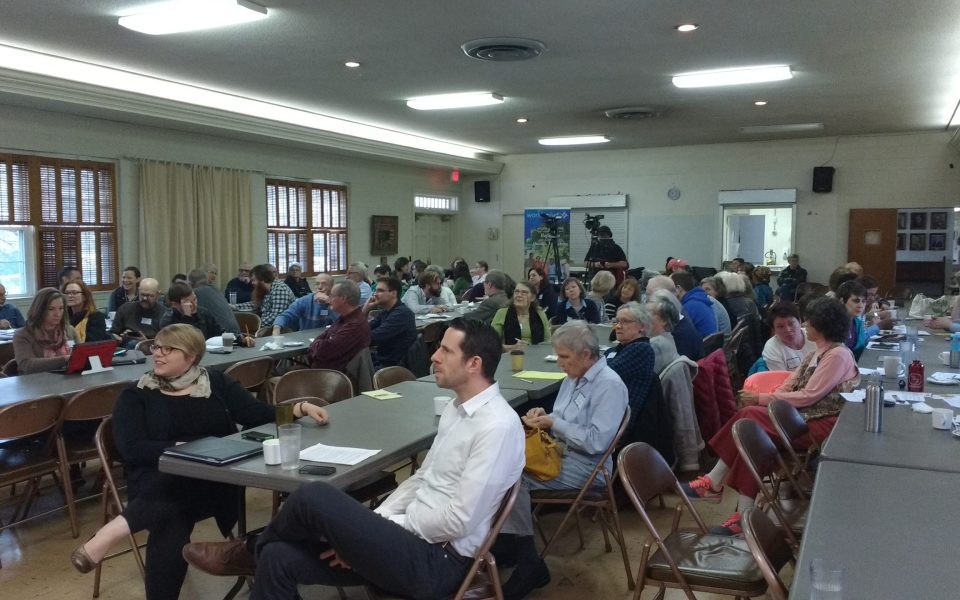by Joanna Rutter
The New Garden Friends Meeting hosted a panel discussion on Saturday morning providing facts about refugee resettlement in North Carolina, and practical ways individuals and faith communities can best help local agencies in their work.
Raleigh Bailey, founding director of the Center for New North Carolinians at UNCG, began the forum by providing the context of North Carolina’s long-held role in refugee resettlement.
“As of 2015, North Carolina is in the top 12 resettlement states,” he said.
Million Mekonnen, executive director of the NC African Services Coalition, said that in fiscal year 2015, Guilford County admitted 673 refugees; Greensboro admitted 355 and High Point took in 318. Mekonnen said nationally, 70,000 refugees were admitted in 2015, and 85,000 will be admitted in 2016.
Mekonnen said his agency expects to resettle 295 new refugees in 2016.
“I do believe we can expect more refugee arrivals in Guilford county in FY16,” he said in a subsequent email. “The anticipated FY16 proposed numbers from the three resettlement agencies in Guilford County is around 1,000 arrivals. That figure could change.”
Though Guilford County has long been a major area for resettling refugees in North Carolina, welcoming outsiders into the state became a widely disputed topic after the Nov. 13 attacks on Paris by Islamic State jihadist militants. According to the BBC, at least one of the suspects had a Syrian passport, which may have been counterfeited, and had possibly entered France posing as a refugee.
Gov. Pat McCrory held a press conference on Nov. 16 requesting that President Obama cease allowing Syrian refugees to enter the country until more stringent security measures were set in place. Guilford County Sheriff BJ Barnes signed a letter supporting McCrory’s request shortly afterward.
The meeting at New Garden Friends Meeting was planned after members of the congregation raised concerns about the refugee crisis and public response last fall, said Pastoral Minister Margaret Webb.
“People are being swayed by rhetoric in the US right now,” Webb said. “Nobody wants to help future terrorists; events like this are a reality check.”
Turnout for the panel discussion on Saturday exceeded expectations. Bailey said he had expected about a dozen people, but more than 100 attended.
Leaders from organizations such as World Relief and the African Services Coalition shared facts and stories about refugees beginning a new life in Guilford County.
Mekonnen stressed the important role of relationships in a refugee’s journey. “Support, they get that from the community,” he said. “They just want to be self-sufficient. No one, nowhere, wants to be a refugee.”
Church World Service’s Greensboro director, Stephanie Adams, echoed Mekonnen’s emphasis on the role of social networks in the context of finding quality, long-term work.
“Refugees are making a huge economic impact on our community,” Adams said. She cited the success of Kieuanh Ho, a resettled refugee from Vietnam who now owns Boba House on Tate Street.
“The perseverance that got them to the US continues here,” Adams said. “Community offers connections.”
Joseph McCann of World Relief in High Point talked about a Winston-Salem church group that built a relationship with a Syrian family.
“There was a powerful moment when the group was welcoming the family in the airport terminal,” he said. “The father said it was the first time he had felt hope in four years.”
McCann said the church group’s connection to the Syrian refugees wasn’t just one-way aid, but a part of a mutually meaningful relationship.
“We’ve seen the need, but the community needs the refugees,” he said. “The [church] team said it changed their lives. Having these folks become part of my life has given me new perspective.”
The importance of forming relationships across cultural divides was heavily stressed, but several attendees brought up that the hurdles refugees face come from issues in immigration and resettlement laws.
Lori Khamala of the American Friends Service Committee, who was in the audience, said people should be just as focused on policy change as individual relationships.
“We can’t talk about welcoming our neighbors without talking about the policies that affect them,” she said. “We also need to put in place better policies that reflect the values of our communities.”
Adams listed plans for other awareness events in the coming months, including a screening of Salam Neighbor at Guilford College slated for early February.
Webb ended the program with an anecdote about discovering the series “Where the Children Sleep” by photographer Magnus Wennman, which documented the crowded and cold places children sleep in refugee camps.
“Those children sleeping looked just like mine,” she said, then paused. “Have a response. Do something.”
Join the First Amendment Society, a membership that goes directly to funding TCB‘s newsroom.
We believe that reporting can save the world.
The TCB First Amendment Society recognizes the vital role of a free, unfettered press with a bundling of local experiences designed to build community, and unique engagements with our newsroom that will help you understand, and shape, local journalism’s critical role in uplifting the people in our cities.
All revenue goes directly into the newsroom as reporters’ salaries and freelance commissions.


Leave a Reply